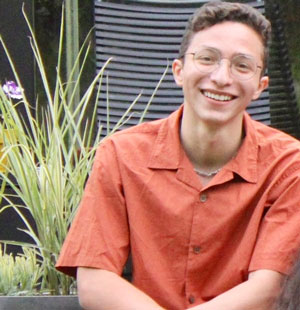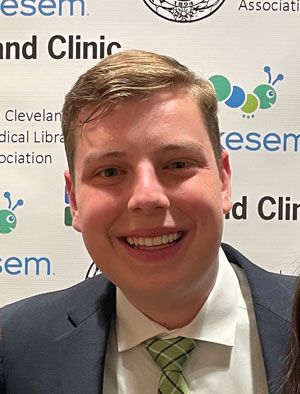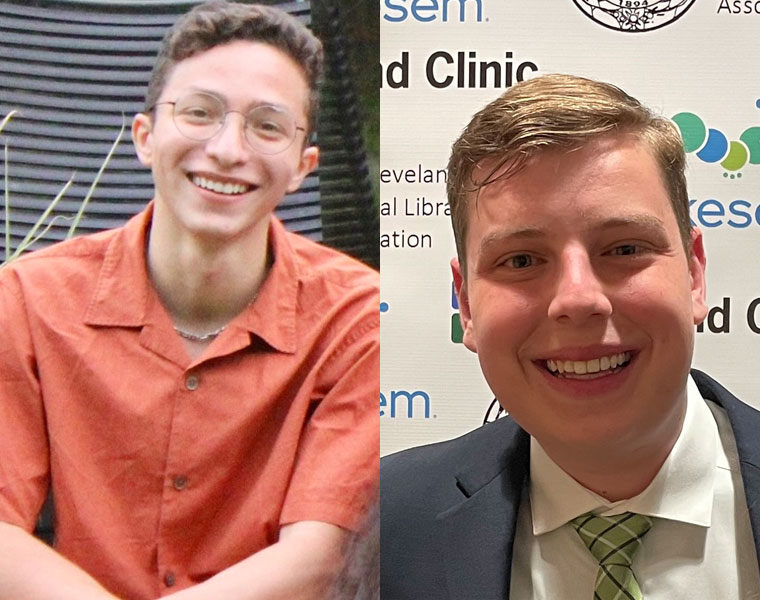As the end of the academic year nears, two Case Western Reserve University third-year undergraduates learned their work so far has earned them national accolades: Victor Sanchez Franco and Mitchell Valentine were among just 417 undergraduates from across the country named recipients of Barry Goldwater Scholarships for their potential in research.
Since 1986, the Goldwater Scholarship program has recognized rising third- or fourth-year undergraduate students who are conducting research in the fields of engineering, mathematics or the natural sciences. To have been considered, each recipient had to undergo a rigorous nomination process; they were chosen from a pool of more than 5,000 applicants.
The scholarship, named in honor of Sen. Barry Goldwater, who served in the Senate for 30 years, awards students with up to $7,500 per academic year to use toward tuition, room and board, books and other expenses.
Learn about the nomination process and this year’s award recipients from Case Western Reserve.

Victor Sanchez Franco
Major: Psychology
Minors: Chemistry, Biology
Anticipated Graduation Year: 2023
Choosing Case Western Reserve University felt like “pure chance” for third-year Victor Sanchez Franco. After initially planning to attend college closer to home at the University of Puerto Rico, Franco applied to CWRU on a whim and didn’t visit until after receiving his acceptance letter. Once on campus, however, his choice was clear—he loved it.
Just as his expectations for college evolved, so too did his career goals. Franco initially sought out hands-on experience in a research lab to bolster a pre-med track, but after three years in the Tabuchi Lab, which focuses on neurosciences, he discovered a true passion for research itself. In fact, he now plans to earn a PhD on his way toward a career as a research scientist.
“There are few things more gratifying than developing new knowledge,” Franco said. “The way I see it, as a researcher, I would be developing new ways to look at the field, not for myself, but to improve the lives of others.”
In the lab, Franco uses fruit flies to explore the molecular and cellular mechanisms that are involved in Alzheimer’s disease. Since joining during the second semester of his first year, Franco has developed a deep understanding of research from Masashi Tabuchi, assistant professor in the Department of Neurosciences at the School of Medicine. Franco considers Tabuchi a mentor, and has even had the opportunity to explore some of his own ideas and projects in Tabuchi’s lab.
“[Tabuchi] really understands my interests and where I want to go,” Franco said. “He pushes me to do better than what I even think I can do.”
Now, Franco’s interests and drive have earned him recognition as a Barry Goldwater Scholarship recipient. After late nights writing his application and waiting in anticipation, Franco received the news that his hard work paid off on a Friday afternoon in the lab—and he burst into tears.
“It was a really surreal moment,” Franco recalled. “I’m not the type of person with the typical background who wins these awards. I was born and raised outside of the States, I learned English later in life and made a switch to science well into my academic career. So, this really reaffirmed that I was taking the right steps toward a science career.”
In addition to his mentor, Franco credits the help of his supportive network, including his family and girlfriend, who believe in him and his vision to contribute to science and become a successful researcher.
Outside of the lab and classroom, Franco is the vice president of civic engagement for La Alianza, a tutor for Refugee Response and a resident assistant.

Mitchell Valentine
Majors: Biochemistry and Psychology
Anticipated Graduation Year: 2023
Mitchell Valentine came to Case Western Reserve with two key interests: cancer research and working with children. On campus, he works on each separately, with his eyes on his ultimate goal: a career in pediatric cancer research.
In his hometown of Chicago, Valentine volunteered with the Special Recreation Association, working with park districts to make their programming more inclusive for all children. Then, when he arrived in Cleveland, he signed up to volunteer at University Hospitals, which, coincidentally, needed help on the pediatric floor.
When it came to conducting research, which he knew he wanted to do, Valentine picked an area close to his heart: breast cancer. Valentine’s mother is a breast cancer survivor, and that experience was a foundational part of his and his brother’s childhood, Valentine said. After doing research and making connections, Valentine met Ruth Keri, a professor of molecular medicine at CWRU School of Medicine, and joined her lab at Cleveland Clinic’s Lerner Research Institute alongside 2021 Barry Goldwater Scholarship recipient and fellow CWRU student Eduardo Medina Williams.
During the application process, Williams acted as a mentor to Valentine, conducting mock interviews and making suggestions for his personal essay. Now, the Keri Lab has two Barry Goldwater Scholars.
In the lab, Valentine works closely with postdoctoral research fellow Lindsey Anstine to conduct research on the TLE3 protein and its ability to control tumor aggressiveness in breast cancer. When this protein is silenced, they observed an increase in genes associated with more aggressive forms of cancer. With the discovery of TLE3 as a critical controlling factor for a shift from a less treatable to more treatable cancer, they hope to develop a novel therapeutic approach for breast cancer.
Valentine’s research, career aspirations and life experiences all come together through his work with Camp Kesem, which provides free summer camp and year-round support for children who have a parent with cancer.
“I know the kind of feelings of fear and stress that go along with [a parent having cancer],” Valentine said. “So, to be able to now give back to that population has been amazing.”
Valentine plans to pursue an MD/PhD in cancer biology and focus on pediatric cancer research, especially the later recurrent diseases caused by cancer treatments in young children.

